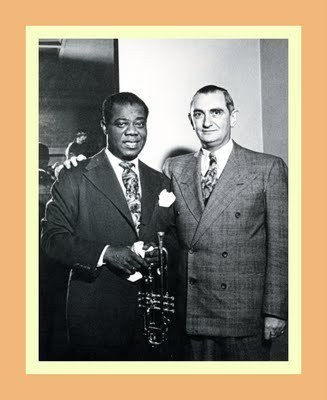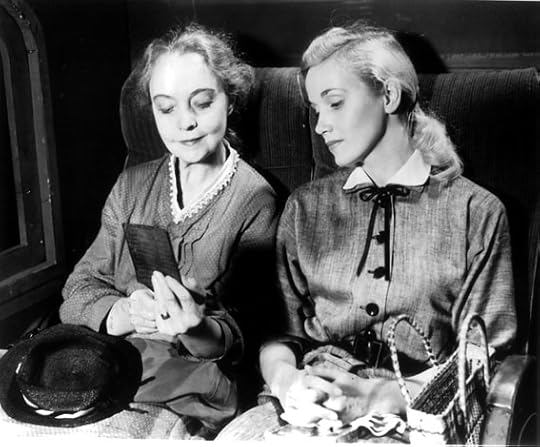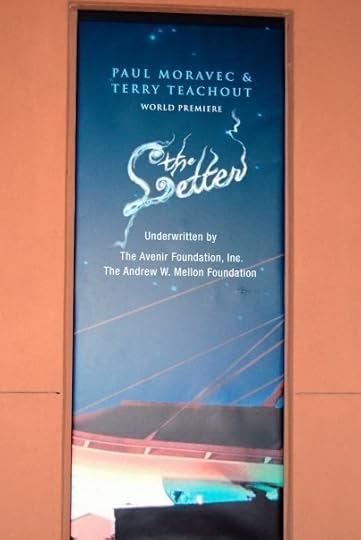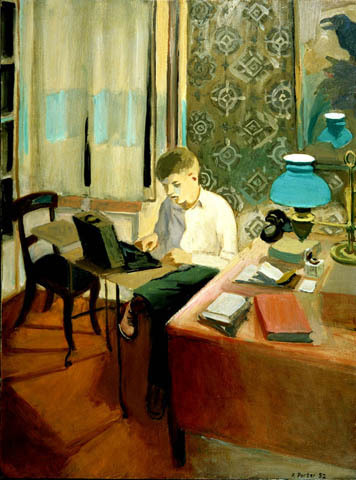Terry Teachout's Blog, page 179
February 16, 2012
TT: Almanac
"The world is always full of brilliant youth which fades into grey and embittered middle age: the first flowering takes everything. The great men are those who have developed slowly, or who have been able to survive the glamour of their early florescence and to go on learning from life."
Willa Cather, "Joseph and His Brothers"
Willa Cather, "Joseph and His Brothers"
Published on February 16, 2012 05:00
February 15, 2012
TT: Snapshot
A 1958 BBC TV interview with Kingsley Amis:
(This is the latest in a series of arts-related videos that appear in this space each Monday and Wednesday.)
(This is the latest in a series of arts-related videos that appear in this space each Monday and Wednesday.)
Published on February 15, 2012 05:00
TT: Almanac
"The stupid believe that to be truthful is easy; only the artist, the great artist, knows how difficult it is."
Willa Cather, The Song of the Lark
Willa Cather, The Song of the Lark
Published on February 15, 2012 05:00
February 14, 2012
TT: Now's the time
 Shakespeare & Company has announced performance dates for the New England premiere of Satchmo at the Waldorf, my one-man-two-character play about Louis Armstrong and Joe Glaser, which stars John Douglas Thompson and will be directed by Gordon Edelstein. Opening night is August 22, 2012, and the show will run through September 2 at the Founders' Theatre in Lenox, Massachusetts.
Shakespeare & Company has announced performance dates for the New England premiere of Satchmo at the Waldorf, my one-man-two-character play about Louis Armstrong and Joe Glaser, which stars John Douglas Thompson and will be directed by Gordon Edelstein. Opening night is August 22, 2012, and the show will run through September 2 at the Founders' Theatre in Lenox, Massachusetts.Tickets go on sale today. We expect them to sell briskly, so if you're interested in coming, don't dally.
For more information, or to purchase tickets on line, go here . You can also call the box office at 413-637-3353.
UPDATE: I just received this e-mail from a Playwright Who Must Remain Nameless:
a critic who's a working playwright!!!!!! outrageous!!!!! outlandish!!!!!! impossible!!!!!!! hoorah!
And yes, I'm smiling. Broadly.
Published on February 14, 2012 15:35
TT: Motto
I put this
Hugh MacLeod
cartoon on the back of my business card around the time that it started looking like
Satchmo at the Waldorf
was going to get produced.
No, I'm not having second thoughts:

No, I'm not having second thoughts:

Published on February 14, 2012 15:30
TT: All-American (II)
One good
list
deserves another, so here are the ten American plays I most wish I'd written. The second "play" is actually an evening-long bill of one-act plays by the same author, but it's my list, so I decided to count it as a single work.
As with my previous list of American novels, the word best was nowhere in my mind when I drew up this roster. Since I've lately become a playwright myself, I suppose you could say that I have more of a stake in this list than its predecessor, but the standards for inclusion are identical: these are the ten American plays that mean the most to me personally. I love them and identify with them, and though I will never live long enough to write anything remotely as good, they collectively define the kind of play I'd like to be able to write:
 • Horton Foote, The Trip to Bountiful
• Horton Foote, The Trip to Bountiful
• William Inge, Come Back, Little Sheba
• David Ives, All in the Timing
• Warren Leight, Side Man
• Kenneth Lonergan, The Starry Messenger
• David Mamet, American Buffalo
• Lynn Nottage, Crumbs from the Table of Joy
• Thornton Wilder, Our Town
• Tennessee Williams, The Glass Menagerie
• August Wilson, Fences
As with my previous list of American novels, the word best was nowhere in my mind when I drew up this roster. Since I've lately become a playwright myself, I suppose you could say that I have more of a stake in this list than its predecessor, but the standards for inclusion are identical: these are the ten American plays that mean the most to me personally. I love them and identify with them, and though I will never live long enough to write anything remotely as good, they collectively define the kind of play I'd like to be able to write:
 • Horton Foote, The Trip to Bountiful
• Horton Foote, The Trip to Bountiful• William Inge, Come Back, Little Sheba
• David Ives, All in the Timing
• Warren Leight, Side Man
• Kenneth Lonergan, The Starry Messenger
• David Mamet, American Buffalo
• Lynn Nottage, Crumbs from the Table of Joy
• Thornton Wilder, Our Town
• Tennessee Williams, The Glass Menagerie
• August Wilson, Fences
Published on February 14, 2012 05:00
TT: Almanac
"The dead might as well try to speak to the living as the old to the young."
Willa Cather, One of Ours
Willa Cather, One of Ours
Published on February 14, 2012 05:00
February 13, 2012
TT: "Make everything more beautiful"
Patrick Kurp's thoughtful
response
to the
list
of ten American novels that I posted the other day contained this observation:
I'm not sure that I'd say often, but I do know that I spend more time reading history and biography than fiction, and I don't know why. I truly love the novels on my list, and many more as well, but all things being equal, I'm somewhat more likely to be reading non-fiction than fiction at any given moment. This has always been so. I tend to read fiction in spurts--I recently spent a whole week revisiting the novels of William Maxwell--whereas there is rarely a time when I'm not either reading, consulting, or writing about a non-fiction book.
 This doubtless has much to do with the nature of my work, and it may also have something to do with the fact that I don't write fiction. On the other hand, I've written three plays and two opera libretti in the past two years, a development without precedent in my writing life and one that puzzles me greatly. I simply don't understand how or why I have suddenly found within myself the desire and ability to write for the stage. As I recently told a friend, it feels as though I've grown another arm.
This doubtless has much to do with the nature of my work, and it may also have something to do with the fact that I don't write fiction. On the other hand, I've written three plays and two opera libretti in the past two years, a development without precedent in my writing life and one that puzzles me greatly. I simply don't understand how or why I have suddenly found within myself the desire and ability to write for the stage. As I recently told a friend, it feels as though I've grown another arm.
It will be interesting to see whether this belated change of life causes me to spend more time reading novels. (I already spend quite enough time reading and watching plays!) Perhaps, consciously or not, I've developed in middle age a greater need for what fiction alone has to offer. Or maybe it's just a manifestation of one of the mysterious cycles of life to which all of us are subject. Eight years ago I noticed with like puzzlement that I seemed to be less interested in music: "It's as if I've become alienated from myself, in much the same way that the victim of a stroke might feel he was no longer himself. I'm not all here."
 Needless to say, the I to whom I referred in that posting came back, if not so decisively as I expected: I spend noticeably less time listening to music now than I did a decade ago, though I don't think that I love it any less. The sad and inescapable truth is that there are only so many hours in the day, and you can only spend them doing one thing at a time. (Playing music while doing something else is not the same thing as listening to it.) It is also inescapably true that there are only so many hours in a lifetime, and at fifty-six, I'm intensely aware of wanting to use the ones that I have left to me as well as possible. I long to spend less time spinning my wheels and more time "making everything more beautiful."
Needless to say, the I to whom I referred in that posting came back, if not so decisively as I expected: I spend noticeably less time listening to music now than I did a decade ago, though I don't think that I love it any less. The sad and inescapable truth is that there are only so many hours in the day, and you can only spend them doing one thing at a time. (Playing music while doing something else is not the same thing as listening to it.) It is also inescapably true that there are only so many hours in a lifetime, and at fifty-six, I'm intensely aware of wanting to use the ones that I have left to me as well as possible. I long to spend less time spinning my wheels and more time "making everything more beautiful."
That last phrase, which is a favorite of mine, comes from an essay by Fairfield Porter: "When I paint, I think that what would satisfy me is to express what Bonnard said Renoir told him: make everything more beautiful." In the past I believed that the only way I could accomplish that goal was by being a good critic and a loving friend and companion. Now it appears that it could also be within my power to accomplish it by being a good playwright and librettist. May it be so!
Some of the satisfactions I once found in fiction--human drama, moral complexity, memorable language--I now find more reliably elsewhere, in poetry, history and biography. One of good fiction's chief virtues, the way it encourages self-forgetting as we inhabit the lives of others, is often better accomplished in other forms.
I'm not sure that I'd say often, but I do know that I spend more time reading history and biography than fiction, and I don't know why. I truly love the novels on my list, and many more as well, but all things being equal, I'm somewhat more likely to be reading non-fiction than fiction at any given moment. This has always been so. I tend to read fiction in spurts--I recently spent a whole week revisiting the novels of William Maxwell--whereas there is rarely a time when I'm not either reading, consulting, or writing about a non-fiction book.
 This doubtless has much to do with the nature of my work, and it may also have something to do with the fact that I don't write fiction. On the other hand, I've written three plays and two opera libretti in the past two years, a development without precedent in my writing life and one that puzzles me greatly. I simply don't understand how or why I have suddenly found within myself the desire and ability to write for the stage. As I recently told a friend, it feels as though I've grown another arm.
This doubtless has much to do with the nature of my work, and it may also have something to do with the fact that I don't write fiction. On the other hand, I've written three plays and two opera libretti in the past two years, a development without precedent in my writing life and one that puzzles me greatly. I simply don't understand how or why I have suddenly found within myself the desire and ability to write for the stage. As I recently told a friend, it feels as though I've grown another arm.It will be interesting to see whether this belated change of life causes me to spend more time reading novels. (I already spend quite enough time reading and watching plays!) Perhaps, consciously or not, I've developed in middle age a greater need for what fiction alone has to offer. Or maybe it's just a manifestation of one of the mysterious cycles of life to which all of us are subject. Eight years ago I noticed with like puzzlement that I seemed to be less interested in music: "It's as if I've become alienated from myself, in much the same way that the victim of a stroke might feel he was no longer himself. I'm not all here."
 Needless to say, the I to whom I referred in that posting came back, if not so decisively as I expected: I spend noticeably less time listening to music now than I did a decade ago, though I don't think that I love it any less. The sad and inescapable truth is that there are only so many hours in the day, and you can only spend them doing one thing at a time. (Playing music while doing something else is not the same thing as listening to it.) It is also inescapably true that there are only so many hours in a lifetime, and at fifty-six, I'm intensely aware of wanting to use the ones that I have left to me as well as possible. I long to spend less time spinning my wheels and more time "making everything more beautiful."
Needless to say, the I to whom I referred in that posting came back, if not so decisively as I expected: I spend noticeably less time listening to music now than I did a decade ago, though I don't think that I love it any less. The sad and inescapable truth is that there are only so many hours in the day, and you can only spend them doing one thing at a time. (Playing music while doing something else is not the same thing as listening to it.) It is also inescapably true that there are only so many hours in a lifetime, and at fifty-six, I'm intensely aware of wanting to use the ones that I have left to me as well as possible. I long to spend less time spinning my wheels and more time "making everything more beautiful."That last phrase, which is a favorite of mine, comes from an essay by Fairfield Porter: "When I paint, I think that what would satisfy me is to express what Bonnard said Renoir told him: make everything more beautiful." In the past I believed that the only way I could accomplish that goal was by being a good critic and a loving friend and companion. Now it appears that it could also be within my power to accomplish it by being a good playwright and librettist. May it be so!
Published on February 13, 2012 05:00
TT: Just because
A cleaned-up version of Gypsy Rose Lee's strip routine, from the 1943 film Stage Door Canteen:
(This is the latest in a series of arts-related videos that appear in this space each Monday and Wednesday.)
(This is the latest in a series of arts-related videos that appear in this space each Monday and Wednesday.)
Published on February 13, 2012 05:00
TT: Almanac
"Oh, my dear little librarian, you pile up enough tomorrows and you'll find yourself with nothing but a lot of empty yesterdays."
Meredith Willson, The Music Man
Meredith Willson, The Music Man
Published on February 13, 2012 05:00
Terry Teachout's Blog
- Terry Teachout's profile
- 45 followers
Terry Teachout isn't a Goodreads Author
(yet),
but they
do have a blog,
so here are some recent posts imported from
their feed.



